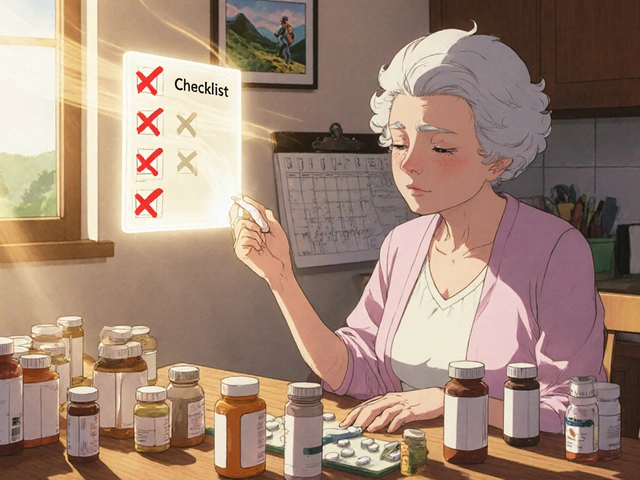Almost one in eight adults in the U.S. is taking an SSRI. That’s not a small number. These medications - like Zoloft, Prozac, and Lexapro - are everywhere. They help people feel less anxious, less depressed, more like themselves. But for every person who finds relief, another is stuck dealing with side effects that don’t go away. Some are annoying. Others are life-changing. And too many people aren’t warned about them before they start.
What Are SSRIs, Really?
SSRIs stand for Selective Serotonin Reuptake Inhibitors. They work by blocking the brain from reabsorbing serotonin, the chemical tied to mood, sleep, and even digestion. More serotonin in the space between nerve cells = better mood signals. Simple, right? But your body isn’t a light switch. It’s a complex system. When you flood it with extra serotonin, everything connected to it reacts. The first SSRI, Prozac, hit the market in 1987. It was a big deal because older antidepressants had harsher side effects and could be deadly in overdose. SSRIs were safer. But “safer” doesn’t mean “side effect free.” Today, they’re the go-to for depression, OCD, panic disorder, and social anxiety. But they’re not magic. And the side effects? They’re real, common, and often under-discussed.Mild Side Effects: The Most Common Ones You’ll Actually Feel
Most people start an SSRI with a list of possible side effects. But no one tells you how fast they hit - or how long they stick around. Within the first week, about half of users feel nausea. Some throw up. Others just feel queasy after eating. It’s not just “a little upset stomach.” It’s enough to make you skip meals, avoid coffee, or cancel plans. For most, it fades in 2-4 weeks. Taking the pill with food helps. A lot. One survey found 63% of people saw improvement just by doing that. Drowsiness? That’s common too. Especially with paroxetine and sertraline. You feel like you’ve been up all night - even if you slept 8 hours. On the flip side, some people get insomnia. You lie there at 2 a.m., mind racing, heart pounding. No wonder 16% of users say sleep problems are their biggest issue. Dry mouth? Dizziness? Headaches? Tremors? These are all reported by more than 10% of people. And they’re not just “mild.” They can make driving hard, talking at work exhausting, or even standing up without feeling lightheaded a challenge.The Big One: Sexual Dysfunction
If you’re taking an SSRI and you’re not having sex - or you’re having less pleasure, less desire, or can’t climax - you’re not alone. You’re in the majority. Studies show 56% of people on SSRIs experience sexual side effects. Real-world data from Reddit and patient forums says it’s even higher - up to 70% over time. Men report erectile problems. Women report loss of arousal or inability to orgasm. Some say it’s worse than the depression itself. Why? SSRIs overstimulate serotonin receptors in the spinal cord and brain areas tied to sexual response. It’s not psychological. It’s biological. And it doesn’t always go away after a few weeks. In fact, 42% of people on Reddit said it lasted longer than six months - even after adjusting dose or switching meds. Some try adding bupropion (Wellbutrin) to counteract it. Others use sildenafil (Viagra) - and it works for 67% of men in trials. Dose reduction helps 40% of people. But many just quit the SSRI because the cost to their relationships and self-esteem is too high.
Weight Gain: It’s Not Just “Eating More”
You start an SSRI to feel better. Then you notice your jeans don’t fit. You didn’t change your diet. You didn’t stop exercising. But you gained 5, 10, even 20 pounds. About 49% of users gain weight on SSRIs. It’s not just appetite. Serotonin affects how your body stores fat and regulates insulin. Long-term use increases the risk of insulin resistance - a step toward type 2 diabetes. The FDA updated labels in 2023 to warn about this. It’s not a myth. It’s science. Some SSRIs are worse than others. Paroxetine is the worst offender. Fluoxetine? Less likely to cause weight gain. But it’s not guaranteed. A 2023 meta-analysis found that people who added structured diet and exercise gained 3.2 kg less over six months than those who didn’t. Lifestyle doesn’t fix it - but it can slow it down.Severe Side Effects: When It’s Not Just Uncomfortable - It’s Dangerous
Most side effects fade. But some don’t. And some can kill you. Serotonin syndrome is rare - but it’s real. It happens when too much serotonin builds up. Usually when you mix SSRIs with other drugs: tramadol, MDMA, certain painkillers, even some herbal supplements like St. John’s Wort. Symptoms start with shivering, sweating, fast heartbeat. Then confusion, muscle rigidity, high fever. If untreated, it leads to seizures, organ failure, death. ER doctors see this. And they’re not always told the patient is on an SSRI. Hyponatremia - low sodium in the blood - is another hidden danger. Especially in older adults. SSRIs are the #1 cause of this among antidepressants. Symptoms? Nausea, confusion, seizures, coma. It’s often missed because it looks like “just getting older.” But it’s drug-induced. And it’s reversible - if caught early. Discontinuation syndrome hits hard if you stop suddenly. Especially with paroxetine or fluvoxamine - they leave your system fast. You get dizzy, nauseous, electric-shock feelings in your head (“brain zaps”), anxiety, insomnia. It can last weeks. The fix? Taper slowly. No more than 10-25% of your dose every 2-4 weeks. Skip this step? You’ll regret it.Who’s at Higher Risk?
Not everyone gets the same side effects. Some people are just more sensitive. - Older adults: Higher risk of hyponatremia, falls from dizziness, and movement disorders like akathisia (that inner restlessness you can’t shake).- Women: More likely to report sexual side effects and weight gain.
- People with low body weight: More prone to sodium drops.
- Those on multiple meds: Drug interactions raise serotonin levels dangerously.
- People with Parkinson’s or movement disorders: Higher chance of worsening symptoms like tremors or stiffness. Genetic testing is now available to predict who’s likely to have bad reactions. About 63% of psychiatrists in a 2023 survey use it. It’s not perfect - but it helps.
What to Do If Side Effects Are Ruining Your Life
You’re not weak for struggling. You’re not failing. You’re just human. - Don’t quit cold turkey. That’s how you get brain zaps and rebound anxiety.- Track your symptoms. Write down what you feel, when, and how bad. Bring it to your doctor.
- Ask about switching. Not all SSRIs are the same. Citalopram tends to be better tolerated. Sertraline is less likely to cause weight gain than paroxetine.
- Try timing changes. Take it in the morning if you’re drowsy. Take it with food if you’re nauseous.
- Ask about add-ons. Bupropion for sexual side effects. Low-dose mirtazapine for sleep. Loperamide for diarrhea.
- Use lifestyle as medicine. Exercise, sleep hygiene, and a balanced diet don’t cure depression - but they reduce side effect severity.
- Speak up. In a 2023 NAMI survey, patients who reported side effects to their doctor were 22% more likely to get help adjusting their treatment.
Is There a Better Way?
Yes - and it’s coming. A new SSRI called Lu AF35700 is in Phase III trials. Early data shows 37% fewer sexual side effects. That’s huge. Researchers are also testing time-release versions to reduce nausea and headaches at the start. And precision medicine - using your genes to pick the right drug - is becoming standard in top clinics. But right now? You’re not waiting for the next drug. You’re living with this one.Final Thought: It’s Not All or Nothing
SSRIs save lives. They help people get out of bed. Go to work. Hold their kids. That’s real. But they also steal sleep, sex, energy, and sometimes, self-respect. The goal isn’t to avoid them. It’s to use them wisely. With eyes wide open. With honest conversations. With a plan for side effects - not just for depression. If you’re on an SSRI and you’re suffering - you’re not broken. You’re just not being heard. Speak up. Track it. Ask for help. Your mental health matters. So does your quality of life.Are SSRI side effects permanent?
Most SSRI side effects are temporary and fade within weeks as your body adjusts. However, some - like sexual dysfunction and weight gain - can persist long-term, even after stopping the medication. In rare cases, sexual side effects may continue for months or years after discontinuation, a condition called Post-SSRI Sexual Dysfunction (PSSD). While not fully understood, research suggests it’s uncommon but real. If side effects last beyond 3 months, talk to your doctor about adjusting your treatment.
Which SSRI has the least side effects?
Citalopram (Celexa) is generally considered the best-tolerated SSRI, with lower rates of weight gain, sexual dysfunction, and sedation compared to others. Fluoxetine (Prozac) also tends to be better tolerated long-term, though it can cause insomnia. Sertraline (Zoloft) is widely used and has a balanced profile. Paroxetine (Paxil) and fluvoxamine (Luvox) have the highest rates of side effects, especially drowsiness, weight gain, and discontinuation symptoms. Individual responses vary, so what works for one person may not work for another.
Can SSRIs cause weight gain even if I eat the same?
Yes. SSRIs affect serotonin receptors that regulate appetite, metabolism, and fat storage. Even if your eating habits don’t change, your body may store more fat or burn fewer calories. This is especially true with long-term use. Paroxetine and escitalopram are more likely to cause weight gain than fluoxetine. Studies show patients on SSRIs gain an average of 2-5 pounds in the first year, with some gaining much more. Adding regular exercise and a balanced diet can help offset this.
How long do SSRI side effects last?
Most mild side effects - like nausea, headache, or dizziness - peak in the first week and fade within 2-6 weeks. Sexual dysfunction and weight gain often develop later and may continue as long as you’re on the medication. Discontinuation symptoms (like brain zaps or dizziness) appear within days of stopping and usually resolve in 1-3 weeks if you taper slowly. If side effects persist beyond 3 months, they’re likely not just temporary adjustments - they need medical attention.
Can I stop taking SSRIs if the side effects are too bad?
You should never stop abruptly. Stopping suddenly can trigger withdrawal symptoms like dizziness, nausea, anxiety, and electric-shock sensations in the head. Instead, work with your doctor to taper off slowly - usually reducing your dose by 10-25% every 2-4 weeks. For SSRIs with short half-lives like paroxetine, tapering is even more critical. If side effects are unbearable, ask about switching to a different SSRI or non-SSRI antidepressant. Your mental health provider can help you find a safer path forward.
Do SSRIs make you feel emotionally numb?
Yes, many people report feeling emotionally flat or detached - sometimes called “emotional blunting.” It’s not just depression returning; it’s a loss of both negative and positive emotions. You might cry less, laugh less, feel disconnected from loved ones. This is linked to how SSRIs affect serotonin in areas of the brain tied to emotional processing. It’s not universal, but it’s common enough that psychiatrists now routinely ask about it. Adjusting the dose or switching medications often helps.
Is it safe to take SSRIs with alcohol?
It’s not recommended. Alcohol can worsen drowsiness, dizziness, and depression symptoms. It can also increase the risk of serotonin syndrome when combined with SSRIs, especially in higher doses. Even moderate drinking can reduce the effectiveness of the medication and make side effects like nausea or insomnia worse. Most doctors advise avoiding alcohol entirely when starting an SSRI. If you do drink, limit it and monitor how you feel - but don’t assume it’s harmless.
Can SSRIs cause muscle weakness or movement problems?
Yes. SSRIs can trigger extrapyramidal symptoms - movement disorders similar to Parkinson’s. The most common is akathisia (inner restlessness), followed by dystonia (involuntary muscle contractions), tremors, and stiffness. These are more likely in older adults, people with Parkinson’s, or those on higher doses. If you notice new muscle tightness, shaking, or inability to sit still, tell your doctor immediately. These can often be reversed by adjusting the dose or switching medications.









Comments (9)
Agastya Shukla
November 25, 2025 AT 08:41 AMSSRIs are pharmacologically fascinating but clinically treacherous. The 5-HT2A receptor downregulation cascade post-initiation explains why sexual dysfunction persists beyond washout periods - it’s not just serotonin overload, it’s receptor plasticity. The 42% long-term sexual side effect rate aligns with recent neuroendocrine studies showing altered dopamine-serotonin crosstalk in the hypothalamic-pituitary-gonadal axis. Most clinicians still treat this as a ‘temporary’ side effect, but the data says otherwise. We need better biomarkers.
Pallab Dasgupta
November 26, 2025 AT 04:36 AMBro. I was on Zoloft for 18 months. Lost my sex drive, gained 30 lbs, felt like a zombie at work. Then I quit cold turkey. Brain zaps? Yeah. But I’d rather have brain zaps than no orgasms. I’m not mad - I’m just done with pharmaceutical fairy tales. You want to feel better? Try fasting, sunlight, and real human connection. Not a pill that turns you into a walking corpse.
Ellen Sales
November 27, 2025 AT 18:40 PMI just want to say - if you're reading this and you're struggling with emotional blunting or weight gain or brain zaps - you're not broken. You're not weak. You're not failing. You're just in a system that doesn't listen. Your pain is valid. Your body is speaking. Listen to it. Find a doctor who believes you. You deserve to feel alive - not just less sad. And if no one's listening - speak louder. I'm here. I see you.
Josh Zubkoff
November 29, 2025 AT 03:51 AMLet’s be real - SSRIs are Big Pharma’s greatest scam since the cigarette industry claimed smoking was healthy. They’re not curing depression, they’re chemically sedating it. The fact that 70% of users report sexual dysfunction and doctors still prescribe them like candy? That’s not medicine, that’s corporate malpractice. And don’t even get me started on the weight gain - it’s not ‘metabolism’ it’s a slow poison. The FDA’s 2023 label update? Too little, too late. This is a public health disaster wrapped in a white coat.
Emily Craig
November 30, 2025 AT 08:25 AMOMG YES. I was on Lexapro for 2 years. Lost my ability to cry. Couldn’t orgasm. Gained 25 pounds. My husband left me because I "wasn't fun anymore". Then I switched to Wellbutrin. My libido came back. I started laughing again. I’m not saying SSRIs are evil - but they’re not magic. They’re a tool. And if they turn you into a hollow shell - it’s time to pivot. You’re not crazy. The drug is.
Dolapo Eniola
November 30, 2025 AT 14:22 PMUSA always thinks pills fix everything 😂. In Nigeria we use prayer, herbs, and discipline. No SSRI can replace the power of God and hard work. You people are weak. Your brain is lazy. Stop blaming medicine and start praying. God will heal you. Also, stop eating junk food and sit properly. Your depression is from sin and bad posture. 🙏🔥
Arup Kuri
December 1, 2025 AT 13:27 PMSSRIs are part of the deep state mind control program. They’re designed to keep you docile while they harvest your data and sell your emotions to advertisers. The sexual dysfunction? That’s intentional - makes you less likely to reproduce. The weight gain? To keep you distracted. The brain zaps? They’re testing neuro-resonance tech. Wake up. The FDA is owned by Pfizer. Google "PSSD" and you’ll see the truth is buried.
Timothy Sadleir
December 2, 2025 AT 04:52 AMWhile the empirical data presented herein is statistically significant and methodologically sound, one must not overlook the ontological implications of pharmacological intervention upon the phenomenological self. The SSRIs, in their chemical essence, disrupt the Aristotelian telos of human flourishing by imposing an artificial homeostasis upon the soul’s natural affective rhythms. One is thus confronted with a paradox: the alleviation of depressive symptomatology at the expense of authentic emotional texture. Is this not the modern condition? We are medicated into compliance, rendered emotionally neuter, and commodified as compliant consumers. The tragedy is not the side effects - it is our collective acquiescence.
Jennifer Griffith
December 2, 2025 AT 12:45 PMwait so paroxetine is the worst? i was on that and i thought i was just lazy. also i thought brain zaps were just my wifi acting up 😅